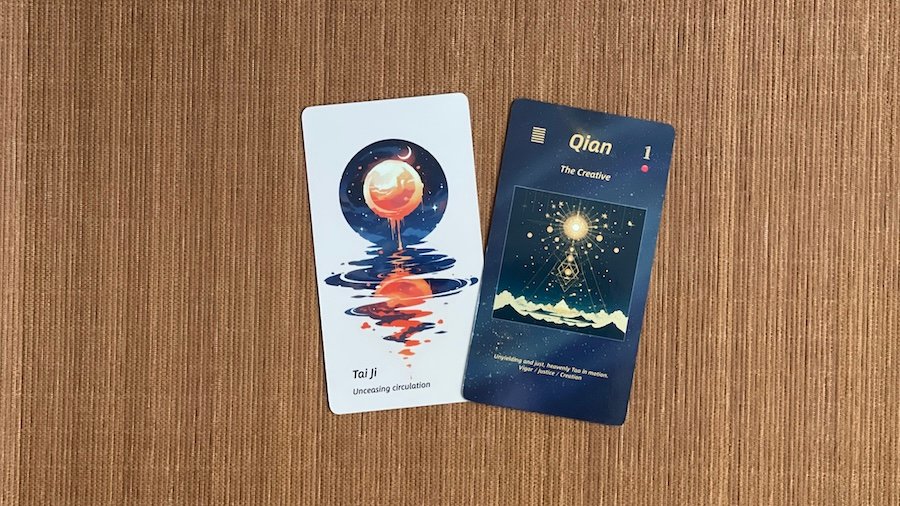
The Six States of the Dragon: The Dialectics of Survival in the I Ching’s Qian Gua
- By YOWAYOW
Why a dragon? It’s no accident that the Qian Gua—the first and most revered of the I Ching’s 64 hexagrams—weaves its wisdom around this mythic creature. In Chinese thought, the dragon is more than a symbol of power; it’s a metaphor for life’s rhythms: diving deep, soaring high, lying low, then leaping again. It embodies the tension between action and stillness, ambition and restraint, visibility and concealment.
Hexagram Overview https://yowayow.com/modern-i-ching-guide/
The Qian Gua’s six lines, tracing the dragon’s journey from the depths to the heights, aren’t just stories. They’re a guide to navigating life’s contradictions—the kind of practical wisdom that feels as relevant today as it did millennia ago.
1. The Hidden Dragon: When Not Acting Is the Smartest Move
“初九: Qianlong wu yong.” The dragon lurks in the deep, biding its time. This isn’t passivity; it’s strategic patience.
There are moments in life when pushing forward backfires—when we’re outmatched, underprepared, or simply ahead of our time. A new grad in a cutthroat field, a startup still finding its footing, someone rebuilding after a loss: these are “hidden dragon” seasons. To “not act” here isn’t surrender. It’s gathering strength, learning the lay of the land, and waiting until the ground under you is solid enough to support your next step.
The paradox? Sometimes not showing up is the best way to ensure you’ll be ready when it matters most.
2. The Dragon Emerges: Shining Just Bright Enough to Be Seen
“九二: Jianlong zai tian, li jian daren.” The dragon rises to the fields, finally visible—but not yet in full flight.
This is the art of measured presence. The “fields” are the everyday spaces where we prove our worth: a team project, a community role, a small but meaningful contribution. It’s about being seen, but not overshadowing others. It’s about earning trust, not demanding attention.
“Li jian daren”—“favorable to meet noble people”—isn’t about networking with VIPs. It’s about putting in the work so that when the right people do notice you, they see substance, not noise.
3. The Diligent Dragon: Striving Hard, But Never Letting Guard Down
“九三: Junzi zhongri qianqian, xi ti ru li, wu jiu.” The dragon works tirelessly by day, stays vigilant by night. No mistakes here.
Success has a way of making us complacent. This line is a warning: the climb gets riskier the higher you go. A promotion might blind you to office politics; a growing business could make you overlook cash flow. “Qianqian”—ceaseless effort—keeps you moving forward, but “xi ti ru li”—watching for danger—keeps you from tripping.
The balance? Ambition without arrogance. Drive without recklessness.
4. The Leaping Dragon: Daring to Jump, But Keeping a Safety Net
“九四: Huo yue zai yuan, wu jiu.” The dragon hovers at the edge of the abyss—ready to leap, but free to retreat.
Life’s big choices rarely come with guarantees. A career pivot, a relationship commitment, a bold investment: these moments demand courage, but also flexibility. “Huo”—“perhaps”—admits uncertainty. Maybe you’ll soar; maybe you’ll stumble. Either way, the wisdom is in leaving room to reset.
It’s not about playing it safe. It’s about knowing when to lean in—and when to step back and try again.
5. The Soaring Dragon: Reaching the Top, But Staying Grounded
“九五: Feilong zai tian, li jian daren.” The dragon finally takes flight, ruling the sky. This is peak success—but also a test.
At the summit, it’s easy to forget how you got there. “Feilong zai tian” is a reward for all the patience, effort, and courage that came before. But “li jian daren” here carries a new weight: even kings need counselors. Even stars need their constellations.
The trap of success? Thinking you no longer need others. The truth? The higher you rise, the more you depend on the people who lift you.
6. The Overreaching Dragon: Knowing When to Come Back Down
“上九: Kanglong you hui.” The dragon flies too high—and regrets it.
Everything that rises must converge. A hot streak can turn into overconfidence; a winning formula can become rigid. “Kang”—“extreme”—is the problem: clinging to power when it’s time to pass the torch, expanding when the market demands 收缩 (shōusuō—contraction), refusing to acknowledge that seasons change.
“ You hui”—“regret”—isn’t failure. It’s a reminder: even dragons can’t stay in the sky forever. Knowing when to descend is part of the cycle.
The Dragon’s Wisdom, Simplified
The Qian Gua’s dragon isn’t six separate creatures—it’s one life, evolving. It teaches that no state is permanent: hiding prepares you to shine; success demands humility; risk needs balance; peak moments hint at what comes next.
This is survival, yes—but more than that, it’s thriving by working with life’s contradictions, not against them. The dragon doesn’t fight the current. It rides it—up, down, and everywhere in between.
Want to explore more cards?
See the full list of I Ching Hexagrams →
All predictions and interpretations on this site are purely for entertainment purposes and should not be taken seriously.
If you have a personal question or dilemma, you’re welcome to submit it.
We choose a few questions to respond to from time to time. Some of these may be featured on our blog, anonymously.
Please note:
Not every question will receive a response.
There is no cost to submit a question.
Responses are intended to inspire reflection, not provide absolute answers.
If selected, your question may be shared on the site, without any identifying information.
Submit your question via email: ask@yowayow.com
By submitting, you agree that your question may be used for public exploration on our site, anonymously and respectfully.